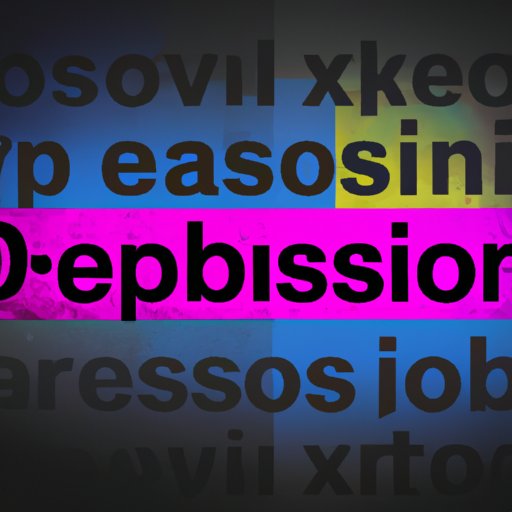
Introduction
Depression is a serious mental health condition that affects millions of people worldwide. According to the World Health Organization, depression is the leading cause of disability globally, affecting all ages and genders. Despite its prevalence, depression is often misunderstood and stigmatized. In this article, we will delve into the topic of depression as a mental disorder, discussing its symptoms, diagnosis, and treatment. We will also address common misconceptions surrounding depression and highlight the importance of seeking professional support.
Depicting Depression as a Mental Disorder
The Diagnostic and Statistical Manual of Mental Disorders (DSM-5) is the standard classification system used by mental health professionals to diagnose and understand mental health conditions. According to DSM-5, depression is characterized by persistent feelings of sadness, hopelessness, and loss of interest in daily activities, lasting for at least two weeks. Other symptoms include changes in appetite, sleep, and energy levels, as well as difficulty with concentration and decision-making. The DSM-5 criteria also require that these symptoms cause significant distress or impairment in social, occupational, or other areas of functioning.
Depression is one of the most common mental health conditions, with an estimated 264 million people worldwide living with the illness. It affects people of all ages, races, and genders. Depression can also occur alongside other mental health conditions, such as anxiety and substance use disorders.
Depression is classified as a mental disorder because of its impact on a person’s thoughts, emotions, and behaviors. The condition affects cognitive functioning, such as decision-making and concentration, making it difficult for individuals to perform daily activities. Depression also impacts social and occupational functioning, leading to social withdrawal and problems with work or school.
Debunking Misconceptions on Depression
Despite its prevalence, depression is often misunderstood, leading to stigma and barriers to treatment. One common misconception is that depression is a weakness or a character flaw. However, depression is a medical illness that requires professional treatment. Another misconception is that depression is not a severe condition and can be overcome with willpower. However, depression is a serious illness that requires proper treatment to overcome.
It is crucial to seek professional help for depression. Left untreated, depression can have a significant impact on an individual’s mental and physical health. Depressive episodes can become chronic, leading to a reduced quality of life and increasing the risk of self-harm or suicide.
It is essential to recognize that seeking help for depression does not mean weakness or inadequacy. It is an act of self-care and strength that can lead to positive life changes.
Depression – A Mind and Body Illness
Depression is a complex illness with biological, psychological, and social factors contributing to its development. Genetics, brain chemistry, and life events are all factors that can contribute to the onset of depression. Biological factors, such as changes in brain chemistry, are responsible for several symptoms of depression, such as changes in appetite and sleep patterns.
Research shows that depression is associated with changes in brain structure and function. In particular, depression affects the areas of the brain responsible for emotion regulation and decision-making, leading to cognitive difficulties and emotional dysregulation.
Depression impacts individuals’ overall health and well-being. It is associated with a higher risk of comorbid physical health conditions, such as heart disease and diabetes. Depression also impacts individuals’ quality of life, leading to social isolation, reduced occupational functioning, and overall impairment in daily life.
Living with Depression
Living with depression can be challenging. However, with proper treatment and support, individuals with depression can lead fulfilling and meaningful lives. Seeking professional help, such as therapy and medication, can significantly improve depressive symptoms and increase wellbeing.
Real-life accounts of individuals who have battled depression can provide insight and inspiration for those undergoing similar experiences. Many individuals with depression have found solace and support through peer support groups and online communities. These communities offer a safe, non-judgmental space to share experiences and receive informed advice from professionals and fellow peers.
Barriers to getting help for depression include stigma, access to care, and cost. It is important to recognize these barriers and take steps to address them. Seeking help for depression is an act of self-love and care that can lead to a more fulfilling life.
The Connection Between Depression and Mental Health
Depression is part of a broader category of mental health disorders. Mood disorders, such as depression, are among the most common mental health conditions, affecting millions worldwide. Mental health care professionals diagnose and treat depression within a broader context of mental health care, recognizing the interrelated nature of mental health conditions.
Depression is diagnosed and treated through a variety of evidence-based treatments, such as cognitive-behavioral therapy (CBT) and medication. Seeking help from a mental health care professional can provide valuable support and treatment for depression and other mental health conditions. Mental health care professionals can provide informed support, guidance, and resources to individuals with depression and their loved ones.
Addressing depression within the broader framework of mental health care can provide individuals with comprehensive and effective treatment options and improve overall health and well-being.
Conclusion
Depression is a challenging illness that affects millions worldwide. Understanding depression as a mental disorder can lead to more effective diagnosis and treatment. Debunking misconceptions surrounding depression and addressing barriers to care can provide individuals with access to the support and resources they need. Seeking help for depression is a courageous and empowering act that can lead to positive life changes and improved well-being.
If you or someone you know is struggling with depression, we encourage you to seek professional support. Mental health care professionals can provide informed guidance and support to improve your quality of life and overcome depression.




